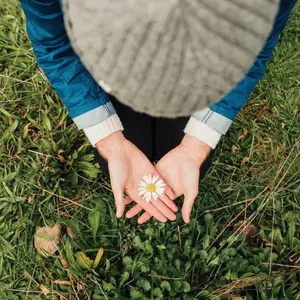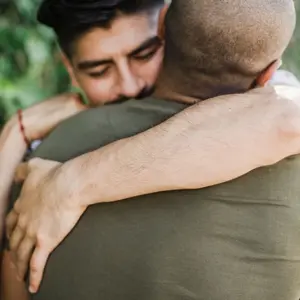

Meaning and Purpose

Meaning and Purpose
Gratitude for Holiday Happiness and Everyday Well-Being
Thanksgiving and holiday celebrations across America this year may look very different from normal. With the pandemic sweeping the country and widespread political, social, and economic upheaval, this is a difficult time for many.
Public health experts are asking us to avoid travel and refrain from celebrating the holidays with extended family and friends. Yet now it may be more important than ever to give thanks for what we do have. Gratitude is a welcome guest at any Thanksgiving and holiday table, especially this year.
Gratitude is defined as the quality of thankfulness and appreciation. The concept of gratitude is a key component of Western philosophy and a hallmark of most world religions. The Roman philosopher Cicero was known to have said that gratitude is “not only the greatest of virtues, but the parent of all others.” Children are taught at a young age to say “please” and “thank you,” often the first lesson in the social skill of gratitude that fosters positive relationships.
Today, researchers are learning that practicing gratitude leads to more than just improved relationships. Gratitude can improve psychological and physical health, as well as workplace satisfaction and success. Gratitude benefits not only the person who practices it, but also those to whom it is expressed.
The mental health benefits of gratitude are the subject of a growing body of research. A 2010 review identified gratitude as a significant determining characteristic of a person’s overall well-being. A recent randomized, controlled trial investigated the premise of whether gratitude writing improves the mental health of psychotherapy clients. The group that wrote letters expressing gratitude to others reported a significant improvement in mental health symptoms as compared to the group that focused on their feelings but not on gratitude. The latter group did not differ significantly from the group that wrote no letters at all.
Several studies have shown a direct connection between feeling grateful and feeling less depressed, and gratitude-based therapies have been associated with better body image, less relationship anxiety, and a more positive outlook on life. In a study of PTSD patients, individuals who rated higher on a gratitude questionnaire had fewer depressive episodes than those who scored lower.
Several studies have shown a direct connection between feeling grateful and feeling less depressed
The positive effects of gratitude can be seen on brain imaging. Though research is limited, studies have shown a correlation between gratitude and physical health. One study looked at individuals with chronic illnesses characterized by inflammation—a group with higher rates of depression due to the debilitating pain they experience on a day-to-day basis over the long term. The participants who rated higher on a gratitude questionnaire experienced significantly less depression and reported less physical pain than those with lower scores. Another study of cardiac patients suggested a correlation between positive psychological attributes, such as gratitude, and improved health outcomes.
Gratitude has been shown to increase feelings of engagement and satisfaction at work, improve productivity, and potentially lead to greater professional success. Employees who receive strong recognition for their accomplishments are more likely to be innovative and take greater pride in their work. Gratitude fosters cooperation, a key component of many human achievements.
Studies have shown that people who practice gratitude are more likely to repay debts or favors and to “pay it forward” to strangers. Known as “cooperators,” they tend to make good team members in professional settings as they are well-intentioned and conscientious. Grateful people are apt to be trustworthy and reliable, but not to the point of being easily taken advantage of. In fact, a propensity for gratitude leads people to expect fairness; grateful people have high moral standards for themselves and others.
Gratitude, when it is expressed to others, can also lead to benefits for the recipients. Researchers at the University of Chicago conducted a study in which participants wrote gratitude letters to others and then predicted how the recipients of their letters would react. The findings showed that the letters had a much greater positive impact on the recipient than the writers expected. The writers were also surprised to learn their recipients felt less awkward about the expressions of gratitude than the writers anticipated. The researchers concluded, “Underestimating the value of prosocial actions, such as expressing gratitude, may keep people from engaging in behavior that would maximize their own—and others’—well-being.”
Cultivating gratitude is a skill that improves with practice.
Cultivating gratitude may not come easily, especially for those who struggle with depression, but it is a skill that improves with practice. Developing the ability to express gratitude can help provide a sense of perspective, particularly in challenging situations. Laura Fisher, of Billings, Montana, suffers from bipolar disorder and offers specialized peer support to others with that illness. She says practicing gratitude is a reminder that “no matter how bad it gets or how far I look back, I have always had good things in my life.” Her gratitude practice gives her more joy in her own life, makes her problems seem smaller, and helps her focus on the positives rather than the negatives. Even a small change in perspective can be just what is needed to get through a difficult day.
There are many ways to make gratitude a habit. Experts agree that the more you focus on gratitude, the more there is to be grateful for. Here are some expert tips for cultivating an attitude of gratitude:
- Start each day with a moment of gratitude. Try to think of three things you’re grateful for, which may be as simple as the view from your window, the warm sun on your skin, or your first sip of coffee.
- Give thanks before meals, even if you’re not religious. You might appreciate the person who prepared the meal, the farmer who grew the food, or the blessing of having a meal to eat and loved ones to share it with.
- Keep a gratitude journal. Each night before bed, write down anything that happened during the day for which you are thankful. You may want to include a statement of gratitude in advance for something you’re hoping for such as getting your dream job or reaching a goal.
- Help others who may be in need or less fortunate than yourself.
- Think about people in your life who have inspired you or made an impact on your life.
Whatever you are thankful for, share it with others this holiday season.
As you prepare to celebrate Thanksgiving and the holidays, take a moment to appreciate the positive aspects of this challenging year. Perhaps the pandemic measures have meant more time at home to build a deeper relationship with a partner or children. If your children are remote learning, maybe you’ve appreciated a shorter school day or a more relaxed morning routine without making sack lunches or rushing for the bus. Perhaps you’ve reunited with adult or college-age children who have come home to live during the pandemic, gaining precious time you might not otherwise have had together. Maybe you have newfound time to exercise or cook more, to slow down from a busy schedule, or to reconnect with distant relatives or friends via video conferencing. Whatever you are thankful for, share it with others this holiday season.
REFERENCES
Association of Accredited Naturopathic Medical Colleges. (2019, November 12). Health benefits of gratitude. https://aanmc.org/naturopathic-news/health-benefits-of-gratitude/
David Perlmutter MD. (2020, May 15). The importance of gratitude. https://www.drperlmutter.com/the-importance-of-gratitude/
DeSteno, D. (2020, February 2). Gratitude helps you cooperate. Does it also make you a sucker? Behavioral Scientist. https://behavioralscientist.org/david-desteno-gratitude-helps-cooperation/?
Fisher, L. (2020, October 19). Finding self-compassion through gratitude. bpHope. https://www.bphope.com/blog/learning-gratitude-practice-bipolar-disorder/?
Adam Markel. (2019, May 20). Your gratitude practice matters. https://adammarkel.com/
Maryland University of Integrative Health. (2020, September 22). Gratitude in the workplace. https://go.muih.edu/webmail/504491/1133373033/d057da3f5b61717a9ddb6e07ceda67b01a6b2722aee27e94b5c4e…
Wong, Y. J., Owen, J., Gabana, N. T., Brown, J. W., McInnis, S., Toth, P., & Gilman, L. (2018). Does gratitude writing improve the mental health of psychotherapy clients? Evidence from a randomized controlled trial. Journal of the Society for Psychotherapy Research, 28(2), 192–202. https://doi.org/10.1080/10503307.2016.1169332


 By
By







